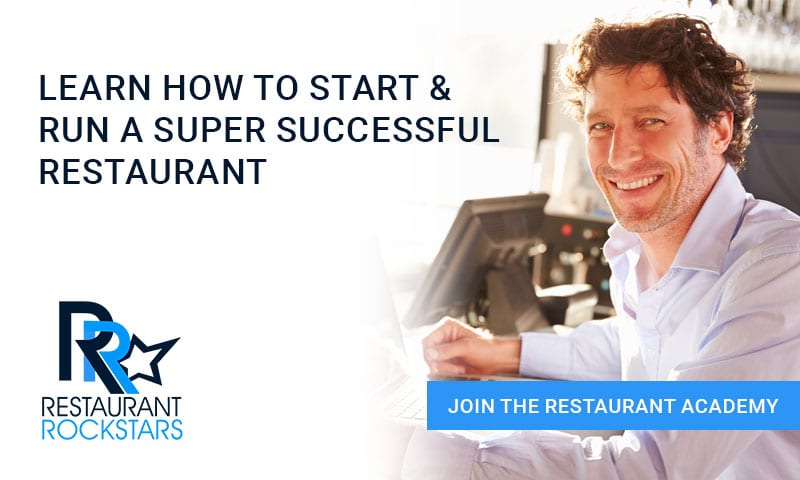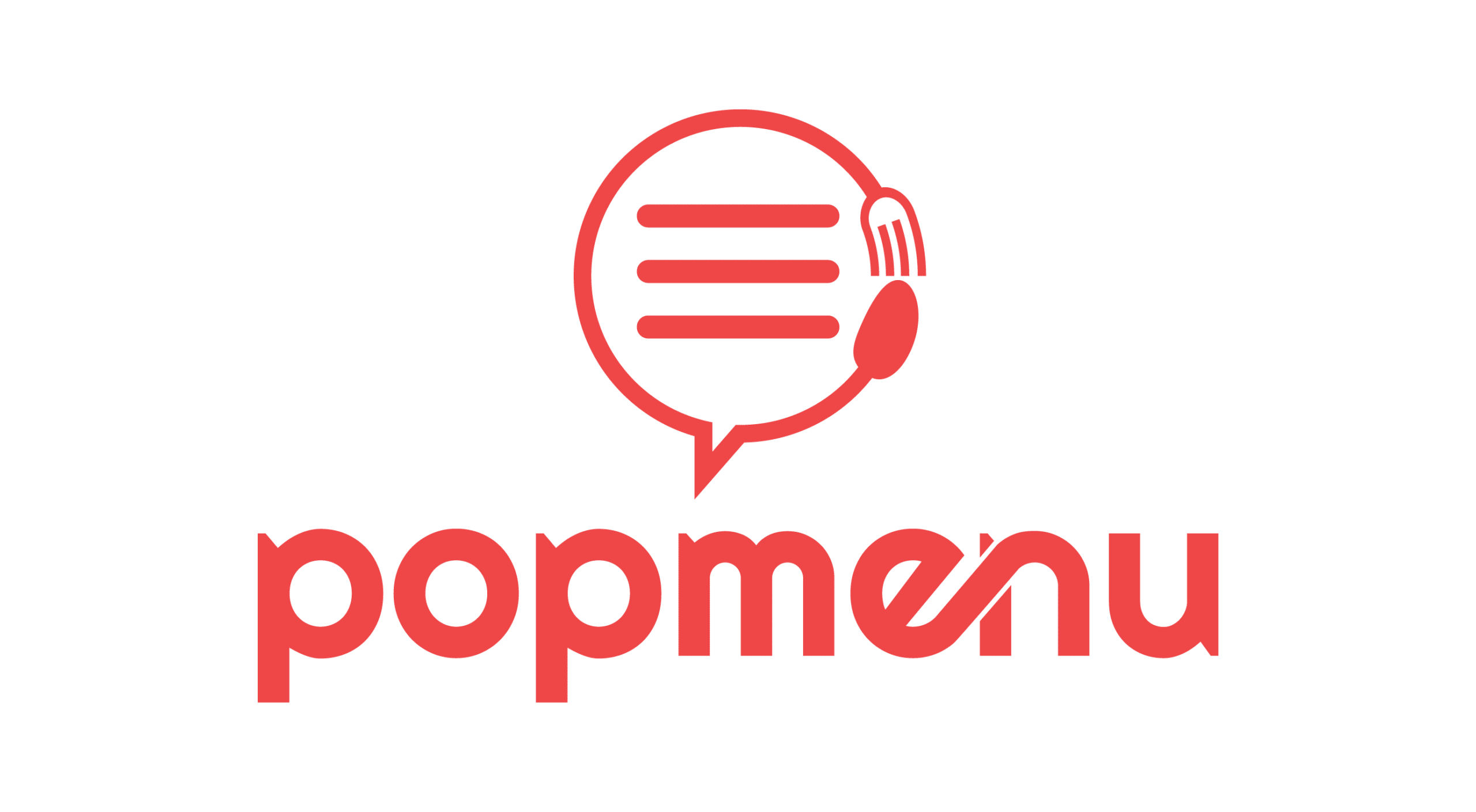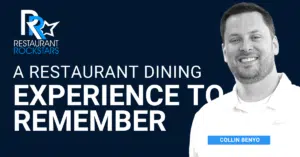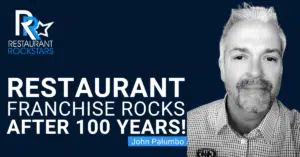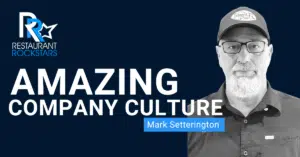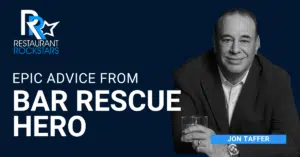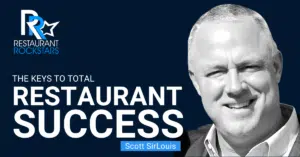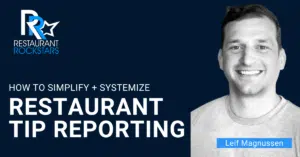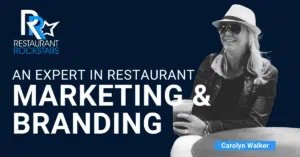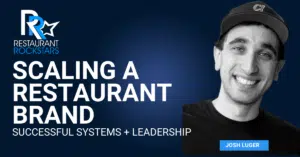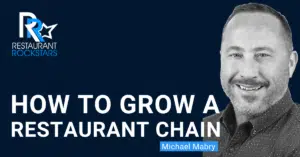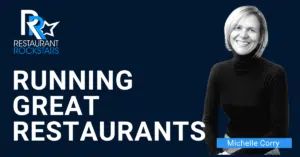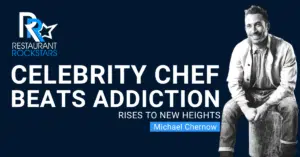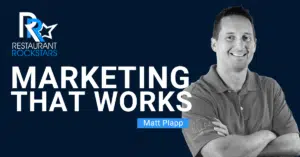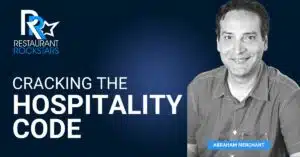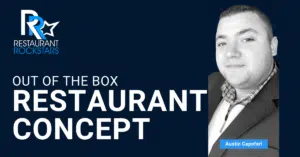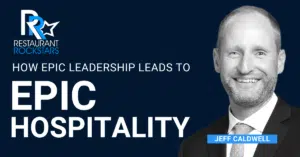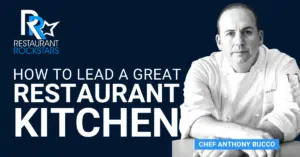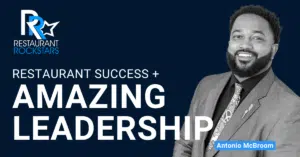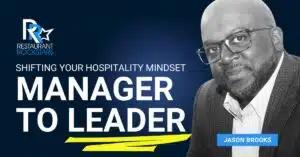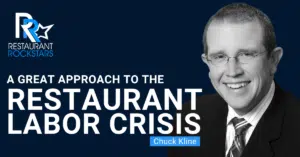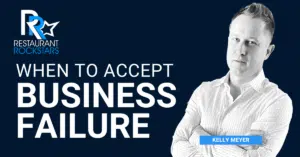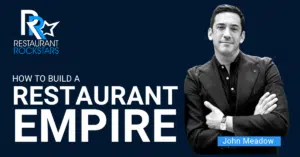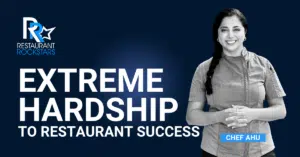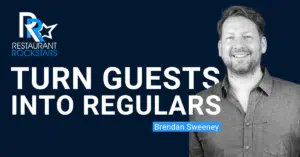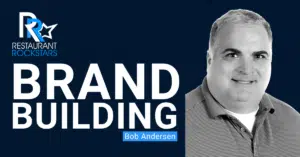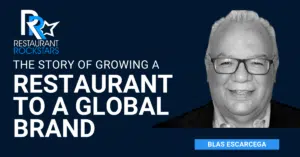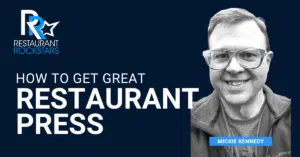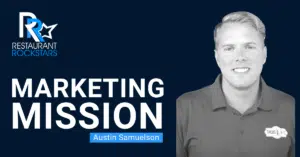Restaurant Rockstars Episode 338
How to Run a Great Restaurant Kitchen – A Chefs Journey
LISTEN HERE OR ON YOUR FAVORITE PODCAST PLAYER
*NOTE – Chef Grace’s video did not record, but it was such a great interview and her message was so valuable, we are releasing it as is. We hope you will enjoy her wisdom as much as we did!!
This episode is all about what it takes to run a great restaurant kitchen and a chef’s journey to success!
There are so many nuggets and key-takeaways you can use in your own operation.
In today’s episode of the Restaurant Rockstars Podcast, I speak with Chef Grace Goudie of Scratchboard Kitchen in the suburbs of Chicagoland.
Listen or watch as Chef tells us:
- How aspiring chefs can take their knowledge and ambition to set themselves apart, up-level their skills and rise to the top of a great restaurant kitchen.
- The importance of learning both financial and culinary skills to maximize your value to any restaurant.
- The way to build a loyal clientele and repeat business.
- The evening out of food cost during inflation using farm fresh ingredients and local suppliers vs. commodity suppliers.
- Leadership style, mentoring and onboarding your team.
- Her experience appearing on the Food Network’s “Chopped”.
- Why everyone at Thomas Keller’s “Ad Hoc” and “The French Laundry” start at the bottom regardless of skillset and experience.
- The importance and profitability of curating a beverage program that compliments and pairs with the menu.
- How ambiance, service and food come together to deliver exceptional guest experiences.
It’s all here as Chef shares her best advice on running a great restaurant and a great restaurant kitchen.
Watch or Listen to this episode and then go out there and Rock YOUR Restaurant!
Roger
Connect with our guest!
https://scratchboardkitchenah.com
Instagram: @chefgracegoudie
Facebook: Chef Grace Goudie Website: https://www.gracegoudie.com/
0:00
A lot of the like non cooking things to learn about running a restaurant, you kind of have to learn and take it upon yourself, whether you’re reading books resources online, or using your mentors taking what they know and their knowledge is hugely helpful. If I could do it over again, I would probably do a minor in business, you get really a lot of that financial background, because that’s something that says opening a restaurant is, you know, the Executive Chef, I’ve really had to take it upon myself to really learn this stuff. Because it’s not something that was ever offered to me. It is something I kind of had to seek out to get that information.
0:36
Hey, welcome back. Thanks for being with me again, on the restaurant. rockstars podcast. My guest today is Chef Grace from a concept called scratchboard kitchen in Chicagoland. It’s all about running a great kitchen and all the ins and outs of developing a team and putting menus together and curating beverage programs and everything you need to know about, you know, philosophies in a successful place, and how the financials are important. And the staff training is important in marketing, we pretty much cover it all. But we also talk a lot a bit about people who are in this business, and how they rise above in kitchens and how they become a chef and rise up through an organization and how you show up and how you set yourself apart from the competition. So it’s great for those aspiring chefs who want to move up, but also existing operators, and all the ins and outs of running a great kitchen. So please stay tuned. Thanks to the sponsors of this week’s episode Whirks, The Birthday Club, Popmenu, and the Restaurant Academy. We talk a lot about systems in this episode. And the academy is your turnkey series of systems for financial management and staff training and marketing inefficiencies in your organization. And now you can assign any of these modules to your staff individually or as a group to learn any of these key things. And I call that an exit strategy for your business. So check that out at restaurantrockstars.com. Now on with the episode.
2:07
You’re tuned in to the restaurant rockstars podcast powerful ideas to rock your restaurant. Here’s your host Roger Beaudoin.
2:23
People go to restaurants for lots of reasons for fun celebration for family for lifestyle. What the customer doesn’t know is the 1000s of details it takes to run a great restaurant. This is a high risk high fail business. It’s hard to find great staff. costs are rising and profits are disappearing. It’s a treacherous road and SMART operators need a professional guide. I’m Roger. I’ve started many highly successful high profit restaurants that I’ve now sold for millions of dollars. I’m passionate about helping other owners and managers not just succeed, but knock it out of the park. I created a game changing system and it’s filled with everything I’ve learned in over 20 years running super profitable, super fun restaurants, everything from creating high profit menu items and cost controls to staff training where your teams serve and sell to marketing hooks, money maximizing tips and efficiencies across your operation. What does this mean to you more money to invest in your restaurant to hire a management team time freedom and peace of mind. You don’t just want to run a restaurant. You want to dominate your competition and create a lasting legacy. Join the academy and I’ll show you how it’s done.
3:42
rockstars, restaurants have been hit hard the last few years which means restaurant owners and staff are working harder than ever trying to meet the demands of in person hospitality can be really demanding, which is why I recommend popmenu answering popmenu answering turns every phone call into an opportunity. It uses artificial intelligence to answer the simple questions that are tying up your phone lines like can I make a reservation or where are you located, and over 50% of restaurant guests are happy to have their questions answered by an automated system. Within the popmenu platform. You can customize answers for your restaurant and choose the voice your guests here and even send follow up links via text message. Popmenu answering picks up your phone 24/7 365 days a year allowing you and your team to focus on what matters most pleasing your guests, prevent loss customers and impress your guests with popmenu answering. And for a limited time my listeners can get $100 off their first month plus lock in one unchanging monthly rate at popmenu.com/rockstars go now to get $100 off your first month and learn more about popmenus full collection of tools at popmenu.com/rockstars. Rock on.
5:05
Welcome back everyone. This is of course, the restaurant rockstars podcast. And I’m so excited today because, you know, I love chef episodes because chefs are the heart of what we call the heart of the house and no exception today, Chef Grace, welcome to the show. How are you today?
5:21
I’m great. Thanks for having me.
5:23
I’m really excited, you have a very interesting background, and everyone starts out in this business in a different way. And this is a business of passion. It’s a business of relationships. It’s a business of networking, and you’ve hit all of those things. You also have formal culinary training, but it begins differently for every person. So please tell us go back as far as you can think of where you first developed, you know, your passion for culinary talent and cooking and this business called hospitality.
5:51
Yeah, so my start within this industry pretty much came from a culmination of a couple of things. First off, I always growing up new, I love to eat. I mean, you got to kind of love to eat if you’re going to be a chef. But then my grandfather was a cook by hobby. And early on in my life, I was always kind of popping into the kitchen and see what he was doing. He was czechoslovakian so a lot of those like schnitzelly, potato dumpling type dishes, just real comfort food, a lot of sauerkraut, that kind of stuff. So I kind of would watch what he was doing and became interested in, you know, the things he would concocting in the kitchen. From there, when I was 12, I took my first home economics class in middle school. And that teacher really is who changed my life. In that class, I was allowed to take my passion for eating, and kind of my interest that I had seen in the kitchen and see how that works. And more of like a real application, when it came to recipes and more formal training, you know, at the age of 12, there’s only so much you can do especially back when I was a kid, there wasn’t a lot of these resources that kids now have. So in that class, I was able to do really simple recipes, but really fall in love with the structure of that. I came home from the class that day, one of those days. And I told my parents, you know, I’m going to be a chef, when I grew up. They laughed at that, you know, they’re both journalists don’t come from the restaurant world. They’re both like, yeah, you know, you’re 12, you don’t really know what you want to do in that I’ve always been very independent, very sure of myself. And I was like, No, this is what I’m going to do. So you know, went through high school work at a breakfast restaurant all throughout high school, sort of the hostess served kind of did all the front of house stuff. Then after that, my parents kind of said, you know, if you still want to be a chef, we want you to go to a four year university, get a degree in whatever you want to get in. And then after that, if you want to be a chef, you can go to culinary school and pay your way through that. So I attended the University of Missouri, where I got a degree in communications and food science with a focus on hospitality.
7:59
Let me let me stop you there for a second because I found that very interesting. You mentioned that your your your parents or one of your parents had a journalism background, was there some sort of an influence to first study the communications journalism and food science thing? And I’m not really sure our audience may not be sure what food sciences? So kind of take us through what that curriculum was all about? And if you found that to be valuable to your future career?
8:23
Absolutely. So yeah, so I’m the youngest of five kids. As I mentioned, my both my parents are both journalists, and all my siblings are somewhere in that field. So you know, I’ve always kind of had a natural knack for writing and journalism and all that. So it just kind of made sense for me to go the communications route. For the reason that, you know, I love food, I love restaurants, I loved all that stuff. But I also wanted to somehow go into media with it as well, when that would happen. Not sure kind of all coming together now. But that’s kind of why I went the communications route was one because of my family’s influence. But also because I knew at some point, I wanted to somehow share my knowledge and my experience and my skills with the world through media somehow. And I think having that background would help me get there a little faster. So that’s kind of why I went that communications route. As for food sciences, science is pretty much the science behind food, if you will, it really shows you the why on things which I really enjoy with food. You know, you can go into a kitchen and cook and put things together. But the food science aspect shows you why these interactions happen and why an egg affects a recipe in this way, then really shows you kind of the curtain behind the food and gives you more of a background on you know why you’re doing things why you’re putting the salt and not just because it’s what you do. There’s a reason for it. So that’s kind of like the gist and a food science kind of idea, if you will. That
9:53
seems very foundational then to becoming a chef. Right? That seems like a core is that a core class in college? Any retraining? I mean, that sounds well again, really foundational to me,
10:04
is yeah, in culinary school, you dive a little bit into that, but culinary school was much more focused on like the art aspect of it, okay. Whereas this is more of the science aspect. So it kind of was just you kind of need to take it upon yourself to learn that side of things. If you are interested in doing it. Obviously, you can cook without knowing the science behind things, but I’m more of a person that I need to know all the answers. So I wanted to know all the information going in
10:31
Inquiring minds want to know. Yes. So did you go directly from there to the CIA? I mean, the Culinary Institute of America obviously needs no introduction. It’s probably the most illustrious cooking school, you know, in the country, if not one of the best in the world. You know, others come to mind in France and all that sort of thing. But clearly, it is a well renowned program. Did you go straight there? Did you have any interim experiences?
10:55
Yeah, I pretty much went straight there. I took like a 10 month break, because but when I graduated between when my program started, there was a little bit of a break. So I just worked in a couple of restaurants, Serving and bartending, that kind of stuff in between, and then headed out to California in started my program, the program I did was a 10 month Fast Track program for anyone who has a bachelor’s degree in a food related fields. So that was really nice, because I didn’t have to take any of the like, prerequisites, I could just take only the cooking classes, which is exactly what I wanted. So it was just really like a deep dive into the culinary world, which is perfect for me.
11:35
Is it a correct assumption to make the CIA programs are highly competitive? And you need you need a certain skill set or background or experience coming in? Or can you just should demonstrate, you know, I really want to become a chef and you apply and maybe randomly they pick so many people? I mean, tell us about the admissions process or about the competitiveness of that school for audience members who may be working in kitchens today and really want to get to the next level. I’m just curious what it would be like to get into a school like CIA?
12:09
Absolutely. So yeah, so my program is I said the requirements was to have a bachelor’s degree in a related field, as per the standard programs at CIA, I know, they do require some restaurant experience. So if you were looking to get into the school, I would recommend just, you know, working at a restaurant for a couple months to a year, just to first off, make sure that’s really what you want to do. I mean, the food profession is the food profession is not necessarily what you see on TV, it is hard work. It’s gritty, and you really gotta love it to really survive in it. And I saw that a lot in culinary school people who thought it was this glamorous world, culinary school, and then, you know, it wasn’t what they thought it would be. So I would really mainly get the experience to confirm that’s what you want to do. Not only is it a big monetary investment, it’s a lot of your time. I mean, when you’re in school, like your life,
13:05
that’s really solid advice. Let me dig a little deeper into programs. Because obviously, you know, you can come out of there and do most anything in a restaurant. And perhaps there’s a focus on administration and management of restaurants, perhaps it’s just the chef focus. And maybe there’s a balance between those two, but let’s just face it, there are a lot of chefs out there that have worked for different restaurants for a long time. And maybe their goal would be to ultimately own their own restaurant, but then suddenly, you need to know so much more than just putting out, you know, delicious, amazing meals. Suddenly, it’s like, okay, now I get to be a marketing expert and a finance expert and dealing with people and human relations and strategic this and that, you know, that’s really what running a restaurant is about. Are there programs that allow you to sort of learn to cook and learn to operate at the same time as finance is a key part of it?
14:00
Yeah, so you know, I wish there was more out there to help you with the non cooking side of things, to be honest with you. A lot of the like non cooking things to learn about running a restaurant, you kind of have to learn and take it upon yourself, whether you’re reading books, resources online, or using your mentors, mentors are a huge part of the industry and taking what they know and their knowledge is hugely helpful. As we’re learning that in school, you kind of get the baseline knowledge in school. I mean, you get all the culinary knowledge you need. You get some financial knowledge, you know, some of those more business side of things. But if I could do it over again, I would probably do a minor in business, in college to get really a lot of that financial background because that’s something that is opening a restaurant is you know, the Executive Chef, I’ve really had to take it upon myself to really learn this stuff. Because it’s not something that was ever offered to me. It was some You know, I kind of had to seek out to get that information. And I actually, you know, my business partner Danielle tune is very business oriented and business minded. That’s the world she came from. So our partnership has been great because she’s helped me a lot of those things. So, you know, it goes back to your word at the beginning networking. People don’t realize it. But networking is hugely important in the food industry. If you want to get a step further than everyone else, and networking, meaning networking with other chefs, but also business leaders, entrepreneurs, all those people that in order to give you the knowledge, you need to get to get another step further.
15:33
Thank you so much for sharing that, you know, I’ve owned many, many restaurants over decades, and I’ve employed formally trained chefs, I’ve employed people that rose up through the ranks as apprentices in the kitchen, I had people that were very well rounded with the costing side of things and making sure my food costs and labor costs in the kitchen stayed line as well as people that put out amazing food, but literally, their costs were through the roof. And it’s like, you know, they’d cost out a menu and they’d give me the costing sheets. And it’s like, I do the math, and it was full of mistakes. And it’s like, okay, this person was never held accountable to the finances. And I make that point, because it is very important. Some restaurants, you know, well, I should say most restaurants should really pay attention to their bottom line. And that is a valuable piece of it. Let me ask you a question, Chef. Let’s okay, we talked a lot about the CIA. Let’s talk about in your career, you’ve seen a lot of people in many, many different kitchens that may have had some natural abilities, some talents, they clearly had the passion, they wanted to stay in this industry, they wanted to keep learning and you mentored. You mentioned the mentorship thing. Is there, you know, any specific way to rise to the top? What advice would you give to these people that won’t have the opportunity to attend a formal program, but they’re in a restaurant now? But maybe it’s like, how, how much experience in any given place? Should you put in and work multiple stations and then to keep rising to the top you work for maybe a more well known restaurant or a celebrity chef run restaurant? It’s like, what what would you say to that?
17:07
Yeah, that’s kind of the nice thing about the food profession is that there’s no one track to get there, there’s no right way to do it, no wrong way to do it. It’s a great industry for people that haven’t had a lot, a lot of opportunity in life, because they can enter an establishment fall in love with what they’re doing, and continue to work towards getting to their goals. So what I would recommend, and what I have done is a setting goals, whether you’re formally trained, or you are coming from, you know, a lower income household, haven’t had any schooling, whatever, it doesn’t matter in the restaurant, which is why I love it. It’s everyone comes from different walks of lives. But everyone that I’ve worked with, or that has gotten ahead, does one thing, and they set goals, whether it’s a one year goal, or a 10 year goal, have a list of things you want to accomplish, and work towards taking those off. I constantly have goals when I accomplish one, I’ll add a goal. So I think that’s a huge thing as a motivator. As for getting into establishments, I would say pick a place you feel passionate about you feel like you love their concept, what they’re doing, whether it’s the food or the person you want to work under, and show up at that place in person right now, technology is everything. Don’t call them, don’t text them, don’t email them show up in person. That’s what they used to do in the olden days. And it’s something that a lot of old school chefs really admire. I had an employee show up last year to my door, and I was so impressed because he’s this 20 year old kid that just walked in the door and said, I want a job. And guess what I did I hired him because he was hungry for it. And that’s not something I’ve seen a lot lately. So show up in person, show them you want it. And any higher end restaurant that sees that will likely hire you as a prep cook, and you work your way up from there. I despite having formal schooling started as a prep cook at ad hoc and worked my way up to sous chef. So it’s all about showing you want it showing you’re hungry. And then using your work ethic and your hard work to prove that you have what it takes. I mean, I spent days from six in the morning until 10 At night at the restaurant just to prove like I want this I want to hear and I’m willing to put this work and so you know, despite people don’t have formal schooling and formal training, that’s totally okay to show that you want it through your actions.
19:36
That is a great takeaway. And I absolutely. I admire that approach. And I believe it’s what people should do to set themselves apart from every other resume that might come in the door for a restaurant. It’s like you put a face to a person and that person demonstrates passion and I really want to work here and more likely than not, that’s the person that’s going to get hired by making that impression versus you know, A faceless name on a piece of paper or phone call, like you said, That’s great. Thank you for sharing that. Okay, so go ahead.
20:09
No, I was just gonna say, you know, it’s, as I mentioned is especially impressive nowadays, too, because I’m really seen in the workforce with the, you know, the labor, the labor struggle right now for all restaurants is a big issue and hiring employees. But a huge part of that is the people coming up in the ranks just have a different way of looking at work and how they work and their work ethic. And so I think if younger people are willing to show kind of what I just mentioned, it would, you know, hugely helped the industry and help people really take their hard work and get ahead, because right now, it’s kind of seen, you’re kind of seeing people that want to do it, but don’t really want to put the work in. And you’re seeing only a couple of these people that have like a true passion for it. So I think that if you really want to, you’re hungry for showing that extra effort, especially now. It’s super helpful.
21:00
Yeah, now you’re talking about ambition, motivation, and inspiration that are clearly you know, key record requisites for success versus I kind of think I want to do this, and I’m just gonna test the waters and try it out and kind of wishy washy about it. No, you’ve got to really, you know, put your best foot forward. So I appreciate that as well. So you came out of the CIA? And then you mentioned ad hoc, Was that your first position where you recruited on campus? How did you get that position because obviously, Thomas Keller needs no introduction either.
21:29
Listen, I’m all about marketing. But believe me, very few marketing ideas today are fully trackable where you know exactly where the business is coming from. And you also know that it’s generating a positive return on your investment. Now, I no longer own restaurants. But if I did, this idea would be at the very top of my marketing plan. It’s all about birthdays. Everyone has a birthday, and they are a huge Let me repeat that huge source of business in your restaurant. Why wouldn’t you want to focus in on reaching everyone with a birthday in your area? Well, you can with the birthday club from Fan Connect. Best part is, they do everything for you. You get a turn-key marketing system that sends birthday cards in advance, inviting people to celebrate your restaurant from your area code, plus a sign up strategy for your existing customers. New business, repeat business hire, check the averages and a massive customer database. You can get all this with the birthday club. Check it out and sign up now at getfanconnect.com/birthdayRockstar.
22:39
Yeah, so I’m from Chicago, the Chicago area and I had full plans after graduation to go back to Chicago. I had interview setups, dodges, setup, etc. And I heard about ad hoc and that they were accepting dodges. And so I was like, I’m just going to do this because I want to see our Thomas Keller kitchen work. I think it’d be interesting to see you know how they do things. So I did this Dodge without necessarily an intention to take the job. I just wanted to see what it was like. And I went in there did the day, fell in love with what they’re doing and was offered a job and took it on the spot without even thinking about it. I’m staying in California taking the job. So it was kind of really like a minute decision. But I learned a lot with my gut and my intuition. And it felt like the place I was supposed to be. I felt at home, I felt right. And it just felt like it was the right next step. So yeah, so I started an ad hoc as a comi, or a prep cook was cutting a lot of potatoes, vegetables, whatnot. And the thing with the Thomas Keller Restaurant Group is they start everybody at the bottom, no matter who you are, which I am a huge fan of this idea that they do that I think it forces people to put in the extra the mat, the extra mile and really work hard to get to where they need to be. So started as a prep cook, really a great time to master those foundations, and then continue to work up the ladder. So actually, after a couple of months, I was promoted to set the party and then pretty shortly after that I was promoted to a sous chef. So I was promoted to a sous chef fairly early on. But it really was a really changing factor in my career. It forced me to learn all these positions and really, you know, get my head in the game super early on and forced me to go through some hardships to lead this kitchen. And you know, I entered a kitchen as the not the most tenured person there. And I was promoted to sous chef before a lot of these people that had been there for a while, which obviously in the restaurant world and the rankings of restaurants, it causes femoris so it forced me to really become strong and strong and what I know and what I do, because I had to kind of of work around these like haters, if you will, and you know, they would give me a hard time about it. But I really had to grow a backbone and form kind of the strong competence I have now in order to kind of survive.
25:15
That’s a great story. Do you by any chance? Or have you seen any episodes of that show on Netflix the bear?
25:23
I have I, I really liked that show. Because it actually, you know, I took a lot from that set watching it last year, because his story and my story really resonate with when Yeah, he went from fine dining. I think they actually mentioned French Laundry in it, you more of a montage establishment, as did I at the exact same time. And a lot of those struggles he mentally is going through internally in the show our struggles that I’ve experienced over the last three years questioning yourself, Am I in the right place? Is this the right move? Am I doing what I’m supposed to be doing? Is this what people think I’m supposed to be doing? All those questions are something that I have dealt with over the last three years since opening a smaller establishment. So that show hugely resonated with me, and I’m excited for the next season too.
26:12
So are we and I saw that connection, because you mentioned obviously, in your first experience, or in any Thomas Keller restaurant, you start at the bottom, that bottom, regardless of experience. And on the show, you know, here’s this, you know, formally trained person from a high end restaurant, who suddenly inherits, like you said, it’s a mom and pop like sandwich shop, and he’s dealing with molding, really raw people that are, you know, obviously, there’s no training there. They’re putting out sandwiches, and it’s this, yeah, Mom and Pop place. But he’s trying to instill the philosophies of that fine dining restaurant in like the sandwich shop and the challenges that he faces in a real gritty part of a major city to put out the best product possible and to uplevel, the entire organization where everyone says, Yes, chef, Chef, I have a question, you know, and everyone calls each other chef, even if they’re just making sandwiches on the line. I thought that was tremendous. So we’re looking forward to it as well. So I’m glad you you’ve seen it.
27:10
Yeah, absolutely. It’s a great show.
27:12
So let’s talk about you had an appearance on a TV show chopped, right. What was that experience? Like? And how did you get in involved with that?
27:21
I did. Yeah. So you know, being on the Food Network has always been a talking about goals, a goal of mine since I was that 12 year old that wanted to be a chef. So I got approached by the Food Network, they found me through my website, I have a website where I teach people, recipes and foundations online. And they contact me and asked me if I wanted this opportunity. And it took me a little bit to decide yes or no on my mom actually, like really urged me to do it. And so you know, part of my hesitation was because as a perfectionist failure is a hard thing to kind of accept and going into an environment like that, you don’t know if you’re gonna be good or bad at it. It’s not only cooking, but it’s cooking with high stakes. And under time constraint, and with ingredients you may have never seen before. So there’s a lot of variables that go into it that could cause you to fail. So kind of the uncertainty of it was was scary. But I decided, you know, this would be kind of my foot in the door at the Food Network. And let’s see what happens. So I decided to do it. And it was one of the best experiences I’ve had pretty much in my career, it, I ended up for one really enjoying the cooking competition aspect of it, which really surprised me, I didn’t think I would like the uncertainty of it. But I really learned that I am very good at thinking on my feet. And I can, you know, come up with things like that, you know, back to kind of the business side of it, it’s kind of fun to come up with a dish that you don’t necessarily have to cost out. And you don’t have to worry about if this ingredients too expensive and switching it for another one. So it kind of gives you full creative freedom, although you have that time constraint. And so yeah, the experience is super positive. It was a lot of fun to be on set, really fun to see how the whole production works out, especially with my more communications and journalism side of my mind. My dad is a TV reporter. So I kind of grew up more on those kinds of television sets in Chicago. So to see a food television set, you know, literally brought tears to my eyes because it was something I’ve always wanted to see. So yeah, if anyone ever gets the opportunity, I highly recommend taking it don’t let fear get in the way because it’s a it was a super positive experience for me.
29:40
A little bit of fun, a little bit of stress, a little bit of underpressure think on your feet, all those things go into it and creativity as well. So that’s thanks for sharing, you know what comes to mind. I mean, not at that level on a television basis, but every restaurant association in the country has an educational foundation that endorses the ProStart program. And very similarly, they have these competitions just about in every state that goes national. And I think the, you know, the big faceoff is at the NRA show coming up, but you literally get handed a, like a Bunsen burner or just a single burner, you get some ingredients, and you got to come up with a dish on the fly, and then compete against other, you know, high school students across the country. And what a great foundational thing that is for our industry as well. I think that develops a lot of future chefs.
30:28
Absolutely, I’ve actually been a little bit involved in the ProStart. In our community in Arlington Heights. I judge the last few years, I’ve been judging the high school baking competition. So we just did that last week. And it’s really cool to see the passion these kids have and, you know, the passion they have around creating these things, and how proud they are to present their items. And I think it’s it’s a program that is so valuable to communities, but also the state in the country that’s really shaping these, you know, next people in the food industry to really do what they love. So it’s a it’s a great, great organization, for sure.
31:03
Okay, let’s talk about scratchboard kitchens, such an interesting, unique concept, and it’s out in the suburbs. So I guess my first question would be, why the suburbs versus the city, and then we’ll talk about the concept.
31:18
Yeah, so you know, coming from a place like the French Laundry, I always thought my next step would be a city. And so when the opportunity came to me to open a restaurant at the time, I was 27 years old, and being offered an executive chef position, which I never thought I would get at that age, I had to make a decision do I want to say no to this opportunity, and try to pursue things in the city work under somebody else in the city and continue to kind of work up the ladder as I had been doing for the last five years? Or do I want to take this opportunity to go off on my own, although it’s not in the setting, I thought it would be in it’s still an opportunity. So I weighed the two options. And as I mentioned, I go a lot with my intuition. And opening scratchboard kitchen just felt like it was the right next step, it was where it was supposed to be. opportunity came to me for a reason, and I needed to take it. So although it wasn’t in the city center of Chicago, it’s still in a very populated area. And we’re able to bring a concept to the dining of Arlington Heights that they needed. You know, there are several good restaurants down there, but nothing that we are doing currently. So I was able to really bring what I know and my expertise into a community that really wanted it. And then COVID ended up happening, we opened one month into COVID. And so having this strong community really helped us get through the hard times of COVID, you know, times are still hard currently. But you know, without that community and that smaller community, I’m not sure we would be where we are today. So I think that’s like a blessing in disguise having been in a smaller community rather than a big city, because it really helped us keep our doors open for one, obviously, as a takeout model, and it helps the community support really lift us up and allow us to open for one and stay open.
33:15
I would call that serendipity. I mean, that’s a wonderful story unto itself. The opportunity sort of found you it called to you but how how did you find the opportunity? How did it come to your attention.
33:27
So my sister actually lives in the town of Arlington Heights, and she is friends with the business owner, Danielle June. So recently, Danielle, and I think in October of 2019, I had been traveling the world in 2019, just eating and doing various cooking opportunities around the world. And when I was back in the US, I kept going back and forth. I was back in the US in October. And Danielle and I connected originally it was more of a consultant role to kind of have me help, you know, get it get it going to be connected in October 2019 And then reconnected in January of 2020. I had a couple other offers for different places on the board. And she ended up you know, we took one more meeting we talked and I just kind of knew it was right. So, you know, it was through more of that networking that we’re talking about. And kind of just the pieces came together.
34:19
Okay, you mentioned opening just before the pandemic where you actually opened as a full service sit down restaurant, and then the pandemic hit and then you had to shift to the takeout model type thing or tell us about that. Like what was that experience like when it first?
34:34
Yeah, so we opened April 2020. So just after like a month into the pandemic or so. Um, so we got the keys, we got the keys to the restaurant, January 2020. Then we’re working to open the restaurant, we’re doing some remodels, all that and then two months into that the pandemic hits so we had to make a decision. Do we sit on this empty space and let it just kind of sit there? Or do we do what we can and open In the doors, so, you know, we adapted, we adapted the entire menu to a takeout model, instead of the dining model and decided to open the doors with this limited takeout menu. So I recreated a lot of my dishes into something that would taste good both now and in 30 minutes, it was really important to me to not put something on this takeout menu that would be compromised once you got home or once it went into a TO GO Box. So I really just made a slim limited menu on things I was confident could carry well, and we opened the doors as a takeout model, we would run the orders out to the car. And, you know, it really brought a lot of joy to people in a scary time, which was, you know, the reason why we do what we do is to bring joy to people. So it was, you know, very fulfilling for us, but also fulfilling for the community to be able to eat this stuff and try something new and a scary time. So yeah, so we, throughout the first a year and a half of being open, we kind of went back and forth when the restrictions would be lifted, we do dine in or whatever we were told we were allowed to do, when they took restrictions back, we’d go back to the takeout model. So I like to say we opened a new restaurant like 10 times within the first year, because every time you kind of switch that model over, it’s literally like opening a new restaurant. But you know, we learned a ton from that adaptation and all the flexibility we had to have, you learn so much about yourself who you are as a leader, who you are as a cook, and just what you need to do for the business in times of turmoil like that.
36:35
restaurant owners and managers Listen, it’s not too late to claim your employer retention credit. But you have to act soon. If you haven’t heard of this, your business can receive money back from the IRS money you’ve already paid in payroll taxes, nothing you do today is more important. Now this is free and clear cash that your business is owed by the government that ERC program is available. If your operation had 500 employees or less, you had to shut down or partially suspend your business, or you had at least a 20% decrease in business due to COVID 19. During any quarter of 2020 and the first three quarters of 2021. Now your business can get up to $7,000 per employee per quarter for 21 and up to $5,000 per employee in 2020. Now if you have just 10 employees today and meet the requirements, you can receive up to $260,000 back in a refundable tax credit that you don’t have to pay back. Now the faster you apply, the quicker you get the money, but you must do it soon. You can use the money for any purpose payroll cost of goods, business improvement or other expenses. Again, you don’t have to pay this money back now works is a company that will do everything for you to get the money that you’re owed. Now I’m speaking from experience with whirks, my restaurant received big checks in all available quarters and works people and process made it easy for a no obligation consultation, click the link in the show notes to this episode and speak to them with no obligation. You pay nothing until they get you the cash back.
38:15
now, was there a strategic marketing plan? When you first started? Do you have a highly visible location that instantly created sort of buzz in the community that people could see a new place is opening up and then everyone’s gonna try that new place. And then you build a following by giving them an amazing experience and creating relationships with those guests. And is there a formal marketing plan in place today? Or is it just you’re a chef, you have a personal draw to people who love your cuisine and your cooking? Perhaps Danielle obviously has a huge network of people that know who her you know who she is? How did you see the business and get it going with your initial customers? How did that happen?
38:56
Yeah, marketing is one of those interesting things, especially in the restaurant world. Um, Danielle actually has a background in marketing. So that’s kind of her specialty. But you know, starting out in a small restaurant that, you know, doesn’t have the funding of a French Laundry, on a lot of our marketing through social media, word of mouth, word of mouth is incredibly powerful. And we really learned how powerful it was. So, you know, starting out, we really use social media a ton, the people we knew, and then local news, like the local newspapers, stuff like that. I think COVID and opening during COVID garnered us a little bit of attention as well. And then you know, my background and who I’ve worked for in the past naturally and organically kind of get some of that attention. So going in there wasn’t necessarily the structured marketing plan. It’s been a lot of survival in the first year or two, just to get the doors open and make sure we are being successful. And so that marketing kind of has evolved with it. As for now we’re now currently developing more of a structured plan and seeing what works for us and what doesn’t. But yeah, I think a lot of it is letting the food speak for itself, letting the photography we take and all that kind of speak on its own. And then also kind of developing, you know, being a chef driven restaurant, putting that in the forefront and letting people know, like, we’re doing things from scratch and from the farm, for this reason, and this is the chef we have, and this is why we’re doing it. I think bringing all of the information and the pieces of the restaurant together. And putting that information out has kind of been our marketing ploy.
40:38
It’s very interesting. Obviously, there’s a female founder owner, but it’s also I understand a female operated restaurant, which is a very unique concept. Does that mean it’s predominantly or it’s all females that work there? Are there any males at all that work in the restaurant?
40:53
Yeah, it’s a mix um, so obviously, Danielle and I are the two female leaders of the restaurant. And then you know, there’s a mix of men and women that work there. But you know, being female, owned and operated, and then a female executive chef, both in itself are very rare, I think first chef, that I’m one of 7%. That’s a female executive chef. So just those numbers, people don’t realize that percentage in itself is pretty stark. So yeah, it’s pretty rare to have restaurants that are female, led, female chefs, all that stuff. So it’s something we’re very proud of. Just because it doesn’t happen very often.
41:36
Does the menu change seasonally? Does it change daily? It’s like, tell us about what the menu is. What would a typical, you know, what would some of the typical choices be if we walked in the door tonight to eat and how often does that change? And you did mention you’re you’re sourcing things locally, it’s farm to table it’s everything is scratch made? I mean, that’s beautiful unto itself. But tell us about the dynamics behind the menu and what you do with it.
42:01
Yeah, so originally, we opened as a breakfast and lunch concepts kind of high end brunch, food, all farm driven, scratch made, as we talked about. So creating the brunch menu, I needed to make sure it’s one efficient because we do we can do up to 400 covers on a given busy day. And we have 60 seats in the restaurant. You can imagine how fast that needs to turn. Yeah, for sure. So you know, I needed to make a menu that was beautiful for the farm items. And you know, my concept which is brunch food that’s not necessarily diner food more a little bit creative, but also make it efficient. So my brunch menu looks like I have one of my favorite dishes is a Dutch baby and pancakes. I take pork from Slagle farms down in downstate, Illinois, I make a homemade sausage gravy with that. And then I make a savory Dutch baby pancake, let that souffle, fill it with the gravy, top it with an egg. And it’s kind of like my version of biscuits and gravy. So I do a lot of like dishes that are familiar and nostalgic, but a little bit more creative and different that you wouldn’t see anywhere else. And then we are actually starting up dinners. We’re doing two dinners a week right now. And that menu is still kind of my creative side of things very European driven. And very farm driven. Right now I have a pork chop schnitzel on the menu that has a uma Bucha yogurt on the bottom, and then Apple fennel, stern apple and cabbage slaw on it. So very fresh, comforting, makes you feel good from the inside out. But also featuring those farm items. So you know, in California when I was working out there, farm to table is not necessarily a term that is thrown around, because it’s something that everyone just does. It’s how people cook out there. It’s not necessarily something people point out. Whereas in Chicago since it, the seasons are a little bit different here. It is Farm to Table something people like to kind of slap on the menu and say we do this even if they don’t. So it was you know, it’s very natural for me to cook this way. But it’s something I definitely wanted to share with people of the area because it’s not something you see very often. Not only that, I think it’s so important to support these small farmers. So we use farmers from Illinois, Michigan, Wisconsin, Iowa, pretty much all around, you know, producing these beautiful vegetables year round, whether it’s you know, in the winter, it’s radishes, beets and lettuces, whereas in the summer you get copious amounts of various melons and fruit and all these beautiful vegetables and fruits and whatnot. So yeah, so I really tried to kind of look at the small guys look at the farmers, the Stanley German farms and give them as much as support as we can. And then I’ll take some of those products in the summer and preserve them for the winter so that we’re still using these products throughout the year.
45:00
So you have a philosophy certainly adopted here about quality about scratch made about supporting the local farmers or even family owned farms and that sort of thing are you finding that you can compete with price, not to use, you know, big box suppliers and that sort of thing that have these huge economies of scale. But obviously, finances are critical in any restaurant, and are you finding that you can get reasonable prices and be able to put, you know, your price points on the menu and still offer that value proposition to the guests based on what you’re serving and where you’re getting the ingredients. So it’s funny
45:34
now adays, that price gap has closed a lot closer than it used to be used to be where you’d buy commodity ingredients for this price and farm ingredients for the price. And it was a huge gap. Now with all the inflation in surplus, that gap has really close and I’m finding farm products and commodity products are pretty much neck and neck. I mean, I’m buying farm eggs for a lower price than I can find commodity eggs. So you know, I guess that’s a plus for our concepts, because those prices are pretty much the same. Now. In the past, it was always that a farm driven restaurant was a little bit more expensive, because these products are a little bit more premium, take a little bit more care, our local had something special to them. And they still do. But now it’s just nice that these prices are a little bit closer. So I kind of take that as a plus in a way because it kind of even just that with other restaurants.
46:38
Let’s talk about ambiance, I’m walking in the scratchboard kitchen for the very first time, what’s my experience gonna be like? What are the sights, the sounds, the smells, the concept, like, take us in as if I’m seeing it for the very first time for our audience.
46:54
So our goal is to make sure that you felt the way the same way the food made you feel. So the food is very quality driven. Even though you’re eating a piece of fried chicken, you’re not going to feel like crap afterwards. Because all the ingredients I put into that piece of chicken are high quality. They’re processed correctly, they’re not anything that’s going to make you feel sluggish and nasty. And that same idea kind of was put towards the ambiance. So when you walk in the door, everything is very fresh feeling a lot of greenery, a lot of white walls, with decorated accents that make you kind of just feel comforted but fresh, and like you want to stay you want to stay a while. So you know that kind of like fresh, happy feeling is what we wanted, especially nowadays people want to feel like they are somewhere they belong somewhere where they can bring friends bring family and be comfortable. So the ambiance is welcoming warmth, and just very attractive, kind of to the soul.
47:58
Thank you mentioned labor a little while ago, have there been any particular labor challenges at scratchboard kitchen.
48:05
I think labor has been one of my biggest challenges since COVID. You know being out in the suburbs, we attract a different quality of labor, you know, in the city, you get a lot of people that go to the schools down there are a little bit more experienced. Whereas in the suburbs, you get people that are a little bit more green, and not necessarily in it for the career more so people that want summer jobs or want to try it or whatnot on. So you know, and being someone who I’m fairly picky with the people I hire just because you don’t ever really want a bad egg in the house. Because that spoils a whole bunch. It’s been a little bit of a challenge, you know, since COVID, a lot of people have fallen out of the industry and gone elsewhere. And I think that, you know, I’m seeing that impact, just with the sheer amount of applicants that we get and you know, talking to my friends who do also have establishments in the city, the same things happening, they’re on a little bit different scale. So I think labor is the one thing right now that restaurants are experiencing is still super impactful since COVID. You know, even though COVID, quote unquote, over or whatever people say, I think that restaurants are still struggling because of it. And that’s not something the general public really realizes. And I think the huge the biggest struggle is this labor thing. You know, I’m on the line multiple days, which as an executive chef, with my other duties I have to do, being on the line kind of puts me behind a little bit and it’s not necessarily something that I try to do very often because I have so many other duties to do. So you know, but also my other duty is to make sure this restaurant is operating successfully. And if that means I’m on the line working the line for a week, then so be it. And you’ll see that you’ll see executive chefs on the line I’m at so many other places simply because they have to right now. So yeah, I would say, labor is a huge struggle currently and has been. And, you know, I’m taking every interview that comes our way and seeing kind of how they are and how they work and kind of deciding from there. But yeah, it’s something that, you know, I think that will continue to be a struggle until more people start to enter the industry again,
50:27
you know, an interesting idea came up with one of my prior guests that has 28 locations in Southern California, and they’re open for three day parts breakfast, lunch, and dinner. And obviously, what a challenge it would be to just staff one place three meals a day, but then now you get 28. So I thought this was a genius idea. But they’re offering $250 gift cards to their guests, who refer a new employee that lasts at least 90 days. So obviously, it’s the cost of your food costs. It’s not $250 cash. And if you get a great person that lasts for 90 days, or even literally becomes a full time, permanent employee, what a great idea. So I just thought I’d share that. Thank you for telling me good idea. Yeah, I mean, yeah, you gotta be creative, and resourceful. You know, it’s, it’s about recruiting versus hiring. That goes without saying it can be what driving down any street in America right now. And you’ll see 30 Now hiring signs, and it’s like, that has no effect. And it’s not going to work. And like you said, you’re gonna get, you know, the bad egg that ruins the bunch. But you really want to focus in on getting the most quality candidates you can for your position. So I just thought that was a great idea.
51:33
Yeah, it’s a great idea. I’ll definitely I’ll definitely use that. I like that.
51:37
Can you speak to your staff training philosophies and your onboarding procedures?
51:44
Yeah, so being a small restaurant. Onboarding is, you know, training is always something that’s really expensive, and that you have to do very carefully. My onboarding process, I like to make sure everyone has all the information in our train very thoroughly. With kitchen training, I always pair the kitchen person up with another more tenured employee. So I have a lead line coach and a kitchen manager, sous chefs type person. So I’ll always make sure new hires are with one of them, to make sure they get the most thorough training, know all the dishes, but also, you know, I have little just like you said in the there, I have little things I do that if you’re coming from more of a chain restaurant or something, you won’t necessarily know how to do these things. So, you know, I think those little finicky things are very important to teach as well, from the way I organize the cooler the way we label things, what color towels you wearing your waist versus what you wipe with little things like that are very important to pass on. And it kind of goes that mentorship thing is, you know, something I’ve been taught through working with Thomas Keller is that mentorship is very important and is what will get us ahead in the industry and using that mentorship philosophy to train the next employee is kind of what I adopt.
53:05
Thank you. You mentioned that Danielle’s very strong financially, obviously, she’s a financially savvy business person, and the restaurant is run, bottom line focus, not just guest experience focused and quality focused. You know, I work with quite a few restaurants where they put a menu together for variety and appeal to the guests. But the profits are kind of all over the place. And obviously, most restaurants have menu categories, obviously starters. And sometimes it’s soups and salads and entrees and desserts. And all those categories have a spread difference in eat amongst the items in each category. And I find that many restaurants are losing many, many dollars when a lower profit item is a more popular a bigger seller than what they could be selling. And, you know, you can obviously maximize the menu profits by shrinking that spread and making sure that the profits are similar. And that way, as long as you don’t have a waste that after a spoilage problem, you don’t care what sells and everything is moving the merchandise and giving the guests a great experience. Would you say that that’s particularly dialed in at scratchboard kitchen is that become a factor?
54:12
Yeah, especially being a brunch focus restaurant. Currently, there’s a lot of items that, you know, some of our top sellers that do come in as a little bit better profitability as say, some of our higher priced items. So you know, say our breakfast sandwich, for example, is our top seller. And it’s we get a great great kickback on it. And inversely, our short rib hash is a great seller as well. But with the beef prices right now we get a little bit more of a slim margin on it. So really, we just tried to, as you said, balanced the menu, balanced the prices in terms of you know what our percentages are and mixing and matching those things. So yeah, it’s something we talk about on a daily basis and we relook at our pricing every single day to make sure with these fluctuating prices, we’re where we need to be, I actually started using a system that helps me with inventory and helps alert me of these price hikes that it’s been very, very helpful to see. Because one day I’ll go on the system and it’ll tell me salmon has gone up $3. And you know, that’s not necessarily something the purveyors and your reps will tell you, but the system that puts it in red, it’s right there and tells me you need to increase this price or some other price right now. And especially in this world where every dollar counts, it’s incredibly helpful to have that information and to be so on top of it as we are,
55:37
thank you for sharing that nugget of information. Because that’s a key takeaway as well, for our audience listening in, I mean, literally, you have to maximize every sale in your restaurant, as well as the bottom line profit of every dish to be successful while you’re not compromising on quality. But then there’s portion control standards that really need to be implemented. And I’m positive that you are on top of consistency with portion controls. And all of that you mentioned, suppliers don’t necessarily tell you that the salmon just jumped three bucks. But it’s proactive to reach out to your suppliers and ask sometimes if they have comparable quality ingredients that maybe they can get at a better price and constantly shift provided, you know, the flavor profile, the quality stays the same, the guest will not know the difference. I mean, I used to do that all the time. Obviously we’d switch products and mange, make sure that the quality was there. But we’d ask for samples in advance and we’d test these items. And if it tasted great, we’d obviously make the switch. But I’m sure you’ve got all that dialed because you’ve got the experience behind it. You also have a curated beverage program. Can you tell us about that?
56:46
Yes, our beverage program is very much of collaboration between myself and our beverage team. So how we do it is I, before we create the new menu, I tell them, these are the things that are going to be in season, let’s create cocktails around these items, we come up with the ideas together. And you know, I have some experience bartending so I know how to put a cocktail together, but more so I use my kitchen expertise and the flavors I know that go together to help them and guide them to create more of this craft interesting cocktail. So you know, we take all of our knowledge, all of our expertise, put it together to create these cocktails that are very seasonal. So that’s really how we do it. And then we create just like a recipe we create the recipe costs it and adjust it from there according to what needs to be adjusted, whether it’s cost flavors, this or that. So yeah, our beverage program is really interesting, because it is that Chef collaboration and it you know, you’re not just getting a gin and tonic with a lime. You’re getting a Origen Fez, you’re getting a rhubarb gin Fez, it has like pink peppercorns in it is very chef driven, kitchen driven, but has that bar expertise to it as well.
57:54
What an excellent extra profit center in your restaurant to curate a beverage program with specialty cocktails as well as those that complement the menu itself. That’s tremendous. So thanks for telling us about that. Are there any plans to expand the scratchboard kitchen concept? It’s very unique, and maybe even a city location or maybe another state or a franchise? I mean, what are the future plans for this company?
58:20
So Danielle and I are two very ambitious people, we’re always talking about what is the future look like for us? You know, we wouldn’t have gotten this far had we not been as strong as strong of a partnership as we are. So we know for sure that we want to continue to work together in the future. As for plans for expanding the actual concept, you know, we’ve had some ideas here and there on what where we want to take it right now our main focus is getting scratch, we’re into what we call a standardization phase. We want to make sure everything is super standardized, codified kind of down to a science where somebody who doesn’t know anything, could open this book up and essentially replicate it all. So we’re getting into that phase right now. And then from there, we’ll expand will it be a carbon copy? Exactly copy and paste? Probably not we’ll probably adjust them, then change it for the environment we’re taking it to. But also we talked about different concepts, whether it be some sort of bakery or a dinner restaurant, like you said in the city. So we play around with all these ideas as we are dreamers and very goal oriented. But right now our main focus is getting scratchboard exactly to where it needs to be because, you know, the first few years of operation, like I said, were a lot of survival, adaptation. So just in the last year have we really been able to hyper focus on this is the business we don’t have to change it anymore and let’s hone in on this and really perfected
59:49
now you’re talking about systems and when your system is dialed and all the templates are in place and a gym can step in and just put the right people in place that allows you and Danielle to then go on to other concepts. So thank you for sharing that as well. If we missed anything, we’ve covered a lot of ground today, and it’s been really great talking to you, we talked so much about what it takes to become a chef. And we talked about your training and your influences, and also the restaurant itself. And what sets that apart from the competition. Anything else you’d like to share?
1:00:20
Absolutely, I think we covered at all we kind of got little morsels of information everywhere. So that’s great.
1:00:27
Well, I certainly appreciate you being a great guest on the podcast. Thanks so much, Chef grace.
1:00:32
Thank you so much. Thanks for your time.
1:00:35
That was the restaurant rockstars podcast. Can’t wait to see you again in the next episode. So please stay tuned and stay well. Thank you, chef for sharing all your operating knowledge and philosophies with our audience. We covered so much territory in this episode, all about what it takes to run a great kitchen, and how you rise up through the ranks and how you set yourself apart from the competition when you’re looking to rise up in an organization as well as the importance of locally sourced high quality ingredients and the price differential that is now evened out. It’s really an eye opener for so many of our listeners. So thanks again for being with us. Thanks to our audience. As always for listening in the restaurant rockstars podcast. Please leave us a review on iTunes or any of the other podcast players. And thanks for continuing your loyalty to listening to what we have to offer. Our goal of course is to continue to provide information that helps you uplevel your organization and rock your restaurant. I can’t wait to see you next time. So please stay tuned.
1:01:38
Thanks for listening to the restaurant rockstars podcast for lots of great resources, head over to restaurant rockstars.com See you next time.


The three costly mistakes you could unknowingly be making?
Find out in this FREE guide and restaurant assessment specifically designed to reveal the unexpected hurdles standing between you and exponential business growth.
Thank You To Our Sponsors
For a limited time only, popmenu is offering our listeners $100 off your first month plus an unchanging lifetime rate.
Request a DEMO:

The Employee Retention Tax Credit We will help you determine your eligibility for 2020 & 2021 - Get Started
Want to become a podcast sponsor?
Please get in touch with Roger at roger@restaurantrockstars.com
